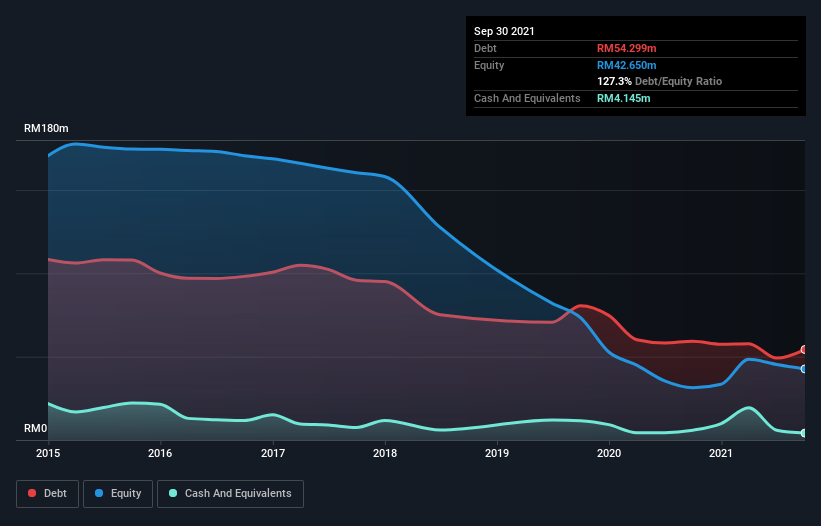
The external fund manager backed by Berkshire Hathaway's Charlie Munger, Li Lu, makes no bones about it when he says 'The biggest investment risk is not the volatility of prices, but whether you will suffer a permanent loss of capital.' It's only natural to consider a company's balance sheet when you examine how risky it is, since debt is often involved when a business collapses. We note that Ipmuda Berhad (KLSE:IPMUDA) does have debt on its balance sheet. But is this debt a concern to shareholders?
What Risk Does Debt Bring?
Debt assists a business until the business has trouble paying it off, either with new capital or with free cash flow. Ultimately, if the company can't fulfill its legal obligations to repay debt, shareholders could walk away with nothing. However, a more frequent (but still costly) occurrence is where a company must issue shares at bargain-basement prices, permanently diluting shareholders, just to shore up its balance sheet. Having said that, the most common situation is where a company manages its debt reasonably well - and to its own advantage. When we examine debt levels, we first consider both cash and debt levels, together.
See our latest analysis for Ipmuda Berhad
What Is Ipmuda Berhad's Net Debt?
As you can see below, Ipmuda Berhad had RM54.3m of debt at September 2021, down from RM59.3m a year prior. However, because it has a cash reserve of RM4.15m, its net debt is less, at about RM50.2m.

How Strong Is Ipmuda Berhad's Balance Sheet?
Zooming in on the latest balance sheet data, we can see that Ipmuda Berhad had liabilities of RM32.1m due within 12 months and liabilities of RM35.3m due beyond that. On the other hand, it had cash of RM4.15m and RM24.4m worth of receivables due within a year. So its liabilities outweigh the sum of its cash and (near-term) receivables by RM38.8m.
While this might seem like a lot, it is not so bad since Ipmuda Berhad has a market capitalization of RM190.7m, and so it could probably strengthen its balance sheet by raising capital if it needed to. But it's clear that we should definitely closely examine whether it can manage its debt without dilution. When analysing debt levels, the balance sheet is the obvious place to start. But it is future earnings, more than anything, that will determine Ipmuda Berhad's ability to maintain a healthy balance sheet going forward. So if you want to see what the professionals think, you might find this free report on analyst profit forecasts to be interesting.
Over 12 months, Ipmuda Berhad made a loss at the EBIT level, and saw its revenue drop to RM30m, which is a fall of 52%. That makes us nervous, to say the least.
Caveat Emptor
Not only did Ipmuda Berhad's revenue slip over the last twelve months, but it also produced negative earnings before interest and tax (EBIT). To be specific the EBIT loss came in at RM9.6m. Considering that alongside the liabilities mentioned above does not give us much confidence that company should be using so much debt. So we think its balance sheet is a little strained, though not beyond repair. However, it doesn't help that it burned through RM39m of cash over the last year. So in short it's a really risky stock. There's no doubt that we learn most about debt from the balance sheet. However, not all investment risk resides within the balance sheet - far from it. To that end, you should learn about the 4 warning signs we've spotted with Ipmuda Berhad (including 1 which can't be ignored) .
Of course, if you're the type of investor who prefers buying stocks without the burden of debt, then don't hesitate to discover our exclusive list of net cash growth stocks, today.
New: Manage All Your Stock Portfolios in One Place
We've created the ultimate portfolio companion for stock investors, and it's free.
• Connect an unlimited number of Portfolios and see your total in one currency
• Be alerted to new Warning Signs or Risks via email or mobile
• Track the Fair Value of your stocks
Have feedback on this article? Concerned about the content? Get in touch with us directly. Alternatively, email editorial-team (at) simplywallst.com.
This article by Simply Wall St is general in nature. We provide commentary based on historical data and analyst forecasts only using an unbiased methodology and our articles are not intended to be financial advice. It does not constitute a recommendation to buy or sell any stock, and does not take account of your objectives, or your financial situation. We aim to bring you long-term focused analysis driven by fundamental data. Note that our analysis may not factor in the latest price-sensitive company announcements or qualitative material. Simply Wall St has no position in any stocks mentioned.
About KLSE:JSB
Jentayu Sustainables Berhad
An investment holding company, engages in trading and distribution of building materials, and other products in Malaysia.
Adequate balance sheet low.
Market Insights
Community Narratives




